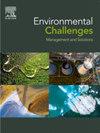Socio-environmental factors and organized criminal networks influencing maritime crime dynamics in Nigeria's Niger Delta
Q2 Environmental Science
引用次数: 0
Abstract
The persistent challenges of environmental harm and economic hardship in Nigeria’s Niger Delta have fostered conditions that enable diverse forms of maritime crime and community unrest. This study employs a parallel convergent mixed-methods research design to examine the interplay of environmental degradation, socio-economic marginalization, and maritime crime in Nigeria’s Niger Delta. Questionnaire, key informant interviews and focus group discussions were used to collect data on environmental degradation, socio-economic marginalization, and maritime crime in the Niger Delta. Maritime crime types experienced by respondents and/or their family members were analysed using percentages. Principal Component Analysis (PCA) was used to analyse underlying latent factors that explain the correlations among maritime crime types, while the Kaiser-Meyer-Olkin Measure of Sampling Adequacy and Bartlett's Test of Sphericity were used to provide critical insights of the data’s suitability for PCA. Findings reveal sea robbery (34.52 %) and inter-communal violence (30.11 %) as dominant crimes, while kidnapping (5.39 %) and oil bunkering (23.13 %) underscore economic desperation. Finding from the PCA identifies three latent factors: (1) socio-environmental grievances (sea robbery, oil violence, waste dumping), (2) economic exploitation (kidnapping, bunkering, trafficking), and (3) protest-driven vandalism linked to unemployment and resource neglect. The community based findings contextualize these patterns, highlighting how oil spills, flooding, and government neglect fuel cycles of poverty, environmental harm, and criminal resistance. Respondents attribute pipeline vandalism and piracy to “survival strategies” amid degraded livelihoods. The study emphasizes the need for multidimensional policies addressing root causes such as environmental restoration, youth employment, and equitable resource governance to disrupt crime networks.
影响尼日利亚尼日尔三角洲海上犯罪动态的社会环境因素和有组织犯罪网络
在尼日利亚的尼日尔三角洲,环境破坏和经济困难的持续挑战催生了各种形式的海上犯罪和社区动荡的条件。本研究采用平行融合混合方法研究设计,考察尼日利亚尼日尔三角洲环境退化、社会经济边缘化和海上犯罪之间的相互作用。通过问卷调查、关键信息者访谈和焦点小组讨论,收集了有关尼日尔三角洲环境退化、社会经济边缘化和海上犯罪的数据。受访者和/或其家庭成员所经历的海事犯罪类型使用百分比进行分析。主成分分析(PCA)用于分析解释海事犯罪类型之间相关性的潜在因素,而Kaiser-Meyer-Olkin抽样充分性度量和Bartlett球形检验用于提供数据适合PCA的关键见解。调查结果显示,海上抢劫(34.52%)和部族间暴力(30.11%)是主要犯罪,而绑架(5.39%)和石油走私(23.13%)则是经济绝望的主要犯罪。PCA的发现确定了三个潜在因素:(1)社会环境不满(海上抢劫、石油暴力、废物倾倒),(2)经济剥削(绑架、藏匿燃料、贩运),以及(3)与失业和资源忽视相关的抗议驱动的破坏行为。基于社区的调查结果将这些模式置于背景下,强调了石油泄漏、洪水和政府如何忽视贫穷、环境危害和犯罪抵抗的燃料循环。受访者将管道破坏和海盗行为归咎于生计退化的“生存策略”。该研究强调,需要制定多维政策,解决环境恢复、青年就业和公平的资源治理等根本原因,以破坏犯罪网络。
本文章由计算机程序翻译,如有差异,请以英文原文为准。
求助全文
约1分钟内获得全文
求助全文
来源期刊

Environmental Challenges
Environmental Science-Environmental Engineering
CiteScore
8.00
自引率
0.00%
发文量
249
审稿时长
8 weeks
 求助内容:
求助内容: 应助结果提醒方式:
应助结果提醒方式:


